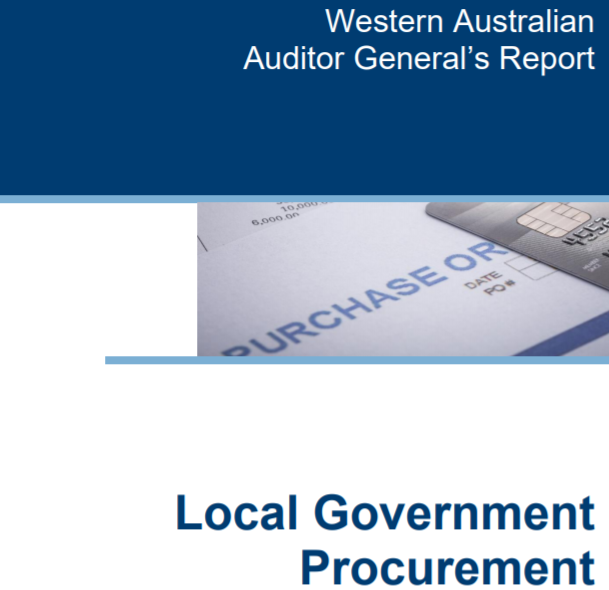
Policy Guide

Procurement Planning

Supplier Discovery

Supplier Management

Go To Market

Compliance Management

Evaluation & Award

Contract Management

Reporting & Analytics
See an overview of all the procurement modules.

Customer Experience

Flexible Ecosystem

World Class Security
See why customers choose the VendorPanel Platform.
Solutions
Glen Duff | 25 Jul 2019 | 3 min read
Government procurement: Five audit focus areas

It’s rare today to find a local government without documented procurement policies and procedures, but these policies are only valuable if they are used effectively and consistently.
A review of last year’s WA Auditor General’s Report on Local Government Procurement and the more recent Audit Office of New South Wales Report on Local Government reveals five areas that auditors in both states have identified as needing attention. And the lessons can be learned at a national level.

Audits are necessary to ensure probity, accountability and transparency in procurement, with compliance management to reduce the risk of:
- unauthorised purchases
- corruption or fraud
- value for money not being achieved.
1. Procurement Policies and Procedures

Councils spend substantial funds each year to procure goods and services. Nearly every local government (LG) audited had policies and procedures in place, but auditors in both states found that procurement activity did not always comply. Broadly, the two reasons for this were:
- staff did not understand the policy requirements, or
- the policy did not meet the LG’s needs.
Non-compliance with procurement policies increases the risk of misappropriation of funds and a failure to gain value for money.
Recommendation: Local governments should review the reasons for non-compliance with policies and address any lack of understanding or awareness among staff with additional training. Policies should be regularly reviewed and updated to reflect current needs and ensure they remain relevant and fit-for-purpose.
2. Procurement Training
Seventy-eight percent of audited NSW LGs and all audited WA LGs provide training to staff with procurement responsibilities. In some cases, training is only provided at induction, through on-the-job activities or as a result of policy updates. While most training programs cover policy, legislative requirements, processes and procedures, auditors found a lesser focus around procurement compliance management, risks and individual accountability.
Recommendation: Provide structured training with regular refresher sessions to reduce non-compliance with procurement policies. Ensure the context around procurement compliance and probity is incorporated into any training.
3. Procurement Controls
Even though LGs are generally performing well in training staff with procurement responsibilities, this is undermined when approvals are being made by staff without the appropriate authority to do so.
Raising a separate concern, the WA Auditor General found several instances of POs being raised after invoices were received. POs should act as an internal approval and control mechanism, but raising POs after receiving invoices renders these controls ineffective.
Recommendation: Use procurement software to tighten controls and minimise or eliminate unauthorised approvals. Provide regular refresher training sessions to staff around your organisation’s PO procedures.
4. Contract Management
Concerningly, contract performance evaluation was not performed across nearly two-thirds (63%) of audited contracts in NSW local governments. Other areas of concern include:
- no contract management policy (67%)
- no risk assessment performed before entering into significant contracts (53%)
- contract variations not evaluated based on value-for-money grounds (50%)
- no KPIs to measure the contract performance (32%).
Recommendation: Create a dedicated contract management policy to supplement higher-level procurement policies and procedures. Ensure robust step-by-step contract management procedures are followed with the assistance of procurement software.
5. Conflicts of Interest
Conflicts of interest need to be better documented. The NSW Audit Office found one-third of audited contracts involved tender evaluation panel members with incomplete conflict of interest declarations, and 22% had tenderers not disclosing conflicts of interest as part of the tender process. Over 60% of audited LGs in WA had weaknesses in how declarations of interest for tender evaluation panel members were recorded.
Recommendation: Create a clear record that shows if a declaration has been signed, then ensure it is reviewed by someone with authority who can assess whether it results in an actual, potential or perceived conflict of interest. Record the decision and the steps taken to remove or manage the conflict of interest.
Properly used, procurement software can be a powerful tool in ensuring appropriate probity, accountability and transparency in local government procurement. Contact VendorPanel to discuss how we can help you in this area.
Sign up to our newsletter
Get insights, news, events and more direct to your inbox.
Further reading
Ready to Know More?
Get in touch, we'd love to hear from you.
















